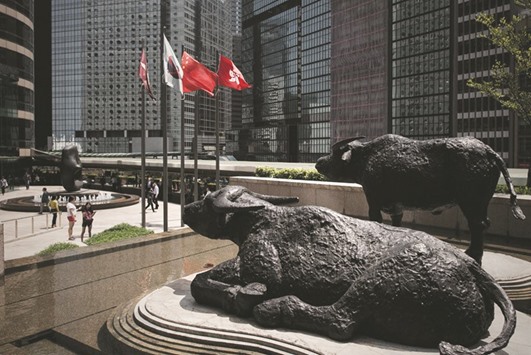Whether Hong Kong stocks rally or slump, investors in the biggest US exchange-traded fund tracking the equities just want out.
Traders have pulled a net $142mn from the iShares MSCI Hong Kong ETF in May, poised for an 11th straight month of net outflows and the longest string of declines on record. While the underlying stock index has fallen 2.6% this month, investors were net sellers even in March, when the gauge staged its biggest rally in four years.
For Standard Life Investments, Hong Kong is suffering from a surfeit of bad news. China’s slowdown is affecting everything from trade to retail sales, a dysfunctional political system is delaying bills and spurring calls for independence, while Goldman Sachs Group is predicting house prices will tumble 20% in a city where business is dominated by a handful of property tycoons.
“In the course of last year or so, there’s been little good news and a whole series of worrying,” said Andrew Milligan, the Edinburgh-based head of global strategy at Standard Life, which manages about $365bn. “It’s no surprise that some people have said, I think this story has reached the end and I need to invest elsewhere.”
The US-listed ETF tracks the MSCI Hong Kong Index, which represents largely local companies including Hong Kong Exchanges & Clearing, developer Sun Hung Kai Properties and utility CLP Holdings. The gauge tumbled 3.4% last week, spurring investors to pull a net $125mn from the ETF - the second-largest net sales in a year.
Net outflows since the end of June last year now total $1.5bn. A 9% surge by the gauge in March failed to entice investors, who yanked $31mn that month. The index fell 1.1% to a two-month low yesterday, taking losses for 2016 to 3.9%.
Investors are turning to other country ETFs, with developing-nation funds in particular luring capital, says Joshua Crabb, Hong Kong-based head of Asian equities at a unit of Old Mutual. The iShares MSCI Emerging Markets ETF drew net inflows of $2.6bn this year, while Vanguard FTSE Emerging Markets ETF is on course for a third straight month of inflows, data compiled by Bloomberg show.
In recent years, buying and holding Hong Kong shares has been a poor investment compared with major peers. The MSCI Hong Kong index has risen 4.3% in total over the past five years, compared with average annual inflation of 4.2% during the period.
The MSCI All-Country World Index advanced 14%, with Japan’s Topix index and the S&P 500 climbing more than 50%. Valuations make the case for buying Hong Kong stocks. Their lagging performance has left the MSCI measure of the city’s shares trading at a 38% discount to MSCI’s global gauge on a price-earnings basis. The city also comes out well on Transparency International’s corruption perceptions index and its foreign currency debt is rated AAA by S&P Global Ratings, while many of its largest companies have overseas earnings that shield them from a stuttering local economy.
Still, challenges are piling up for Hong Kong’s economy, which is projected to grow at its slowest pace in four years this year. Retail sales plunged 12.5% in the first quarter amid falling numbers of mainland visitors. China’s suspected abduction of booksellers from the city has raised international concern about the strength of Hong Kong’s rule of law, while filibustering by opposition lawmakers is holding up bills.
For Fountainhead Partners, it’s uncertainty over the property market that makes Hong Kong stocks most unappealing to foreign investors.
Home prices have fallen 13% from last year’s peak and analysts warn the worst is still to come. Higher US interest rates would boost borrowing costs, thanks to the Hong Kong dollar’s peg to the greenback. Real estate developers and owners have a 27% weighting in the MSCI Hong Kong index.
“Global investors don’t look at Hong Kong as an ideal market because Hong Kong is mostly driven by real estate and trade,” said Pu Yonghao, chief investment officer of Fountainhead Partners, which oversees about $600mn. “The property index is already coming down, so why should people buy Hong Kong?”

Bull statues are seen in front of the Hong Kong Stock Exchange. Traders have pulled a net $142mn from the iShares MSCI Hong Kong ETF in May, poised for an 11th straight month of net outflows and the longest string of declines on record.
